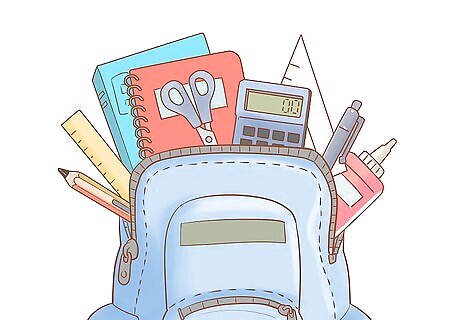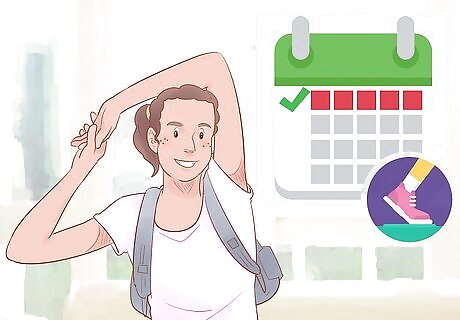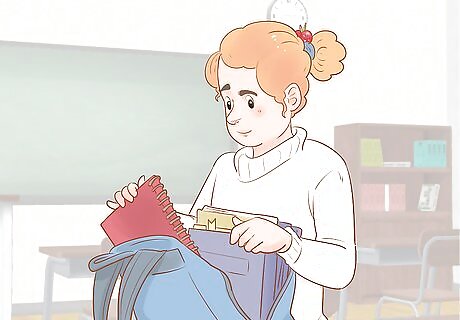
views
Planning for the School Year

Get 1-2 new outfits to wear during the first week. While you don't need a whole new wardrobe, having a new outfit for the first day can make you feel more confident. If your school doesn’t require uniforms, save up to get an outfit or 2 that you like, or get a new pair of shoes to wear for the year. Once you have an outfit that you like, make sure you style it appropriately for school. Keep in mind that whatever you wear should follow your school’s dress code. If you don’t have a lot of room in your budget for a new outfit, mix and match your old clothes to make new outfits, visit a thrift store to find inexpensive clothes, or organize a clothing swap with your friends where you can all trade clothes.

Purchase the supplies that you’ll need for the school year. Visit an office supply store or local supermarket to pick up a few folders, pencils, notebooks, and other supplies that your school wants you to have. If you’re not sure what you need, check your school’s website, ask a store associate, call the school to ask them, or look up lists for your grade level online. Your classes might require you to get specific supplies, like a protractor for geometry class or a world map for history. You don’t have to get a new backpack and lunch box every year, but if yours have rips or tears in them from last year, remember to get a new one when you’re shopping for school supplies.

Do a practice run a week or so before the first day. If you have the time, pick a day and pretend like it’s your first day. Go to bed early the night before, wake up on time, and do your morning routine. Head to the school to see how long it will take you to get there, and go in the school to find your classes and locker if you’re able to. Many schools have new student orientations to introduce the school to new students. See if your school has one of these and go to it to prepare for your first day in a new school!

Adjust your sleep schedule 10-14 days before the first day. Try to go to bed at your normal “school year” bedtime every night starting about 2 weeks before classes begin. If you’re having trouble getting to bed at night, try waking up earlier so that you’re tired earlier in the day. Try to follow a consistent routine for bedtime, including brushing your teeth, turning off electronics, and taking time to relax. If you need to, try reading a book or listening to calming music before you get ready for bed to get into a relaxed mindset.

Talk to your parents if you’re worried about bullying or teasing at school. Whether you’re going to a new school or heading back to the same school, bullying is an issues for many kids. If you’re having anxiety, feeling sad or are scared, sit down with your parents or someone you trust to discuss what’s going on. Ask them to talk to your principal and school counselor with you to address the issue before the school year begins. If you have a close friend who you can trust, try talking to them about how you’re feeling. If they know you’re worried about being bullied, they’ll be able to watch your back and help you if you do end up in a bad situation. During the school year, if you’re experiencing bullying of any kind, including cyber bullying, don’t be afraid to tell a teacher or school counselor. They’ll likely be happy to help you and can help you find a solution to the problem.
Getting Ready for the First Day

Set out your supplies and clothes the night before. Plan out what you're going to wear and what you will need for class. Pack your book bag with everything you need for the next day and double check that it’s all there. If you wear makeup or style your hair in the morning, lay out those products as well so you don’t have to search for them. If you have physical education, pack a gym bag with extra clothes, deodorant, soap if you plan to shower, and anything else you might need for the day. Set it next to your book bag so you don’t forget it.

Pack a lunch if you don’t plan on buying food in the cafeteria. To save time in the morning, prepare your lunch ahead of time and store it in the refrigerator. For the first day, focus on bringing healthy, filling food that won’t spoil if it’s outside of the refrigerator. Don’t forget to include a drink in your lunch, and pack yourself a treat like a piece of chocolate to help you get through your day. For example, you might make a sandwich for the first day. For snacks, you can include a piece of fruit like an apple or banana, and another healthy snack, like pretzels, trail mix, or a protein bar. Pack a water or a juice to drink with your lunch, as well! If you’re not going to pack your lunch, be sure to have at least $5-$6 on hand for buying lunch from the cafeteria. Some schools have lunch accounts where you should be able to load money onto your account before the school year. If you don’t have an account, bring cash to pay for lunch.

Get at least 8 hours of sleep. Choose a bed time that will give you at least 8 hours of sleep, depending on when you wake up in the morning. When it’s time for bed, turn off the lights in your room, and put away or turn off any electronics, like your phone, laptop, video games, or TV. If you’re having trouble getting to sleep, turn on a dim lamp and read a book, or take a warm bath to relax. Avoid exercising, watching scary movies, or drinking anything that has caffeine in it before going to bed. These can all make it difficult to get to sleep, causing you to be tired for your first day. For example, if you need to wake up at 6 a.m., you should be in bed by 10 p.m. to get 8 hours of sleep.

Set your alarm so you have plenty of time to get ready. Give yourself at least 1 hour to get ready for the day. Depending on your morning routine, you might not need a full hour, but it’s best to plan ahead to give yourself enough time. Plan to take a shower, get dressed, do your hair, apply makeup if you wear it, and eat breakfast. If these tasks take you longer than an hour, set your alarm for 15-30 minutes earlier. Remember, you should be leaving your house with plenty of time to get to the school. EXPERT TIP Ashley Pritchard, MA Ashley Pritchard, MA School Counselor Ashley Pritchard is an Academic and School Counselor at Delaware Valley Regional High School in Frenchtown, New Jersey. Ashley has over 3 years of high school, college, and career counseling experience. She has an MA in School Counseling with a specialization in Mental Health from Caldwell University and is certified as an Independent Education Consultant through the University of California, Irvine. Ashley Pritchard, MA Ashley Pritchard, MA School Counselor Stay calm and wake up early. Make sure you get up soon enough to prepare for the day and get to school on time. Once you're there, pay attention in class and try to stay calm. School can be overwhelming, but if you remain calm, your day will go better.

Eat a healthy, filling breakfast. Your breakfast is your fuel for the first part of the morning. Try foods like cereal, muesli, toast, pancakes, fruit, or even smoothies. Focus on eating foods that have a lot of protein and fiber, like meat, peanut butter, eggs, oats, nuts, and bread. Stay away from sugary cereals and pastries because they can cause you to have a sugar crash later in the day. If you’re short on time for your first day, try making yogurt parfaits with fruit, oats, nuts, and peanut butter or almond butter the night before. Then, you can just grab the parfait from the fridge and eat it while you get ready. If you have enough time, try making a full breakfast of eggs, toast, sausage, and fruit to get a well-rounded and balanced meal for the day.

Leave early to walk, drive, or take the bus to school. Plan your route to the school before your first day, and leave with at least an extra 15 minutes to get there. If there’s traffic or you have to find a different route, you won’t be late. Make sure you get to the bus stop at least 5 minutes early in case the bus arrives early. If your parent is taking you to school, ask if you can leave a little early so you can meet with your friends and compare classes. Your parents might also want to take pictures before you depart for the day. Be sure to plan at least 5 minutes for this while you’re on your way out of the door!
Socializing at School

Meet up with old friends to talk about your classes. When you arrive, follow the other kids to the waiting area where students can meet before the first bell rings to tell them to go to class. Look for familiar faces and say hi or compare schedules and make plans for lunch. If you don’t see anyone you know, use this time to make a new friend or look at your class schedule for the day! If you can, call or text your friends before the first day and plan where you’ll meet and ask them what their schedules look like. That way, you’ll know who you can sit by in your classes or prepare to make new friends.

Make new friends throughout the day. During class time, if you’re assigned group work or sit down next to someone you don’t know, be yourself and be friendly toward them. If you’re going to a new school, don’t be afraid to talk about where you’re from and reach out to new people on the first day. Even if you’re nervous, try to make at least 1 new friend on the first day. Introduce yourself to people in class and in the hallways. Try saying something like, “Hi, I’m Jess! Math is my favorite class, but I’m worried this year is going to be hard. I’ve heard this teacher is good, though! What about you?” If you keep seeing someone in the halls on your way to class, don’t be afraid to smile and wave. Remember, you should only talk during class if the teacher says it’s okay to do so, like before the bell for class rings. If the teacher is speaking, it’s best to wait until the lesson is over and then make friends.

Have a positive attitude and be outgoing in class. Sit by your friends in class if you can, and use lunch or a free period to socialize and enjoy the day. Try to keep a positive attitude and think about all of the exciting things you’ll learn about during the year. If there’s one class you’re really interested in, don’t be afraid to ask questions and talk to the teacher about what you’ll be learning. While you should make the day fun for yourself, be sure to pay attention in class and respect your teacher during their lesson. If you talk during the lesson or make inappropriate jokes, your teacher may give you a warning about your behavior.
Getting Through Your Classes

Introduce yourself to your teachers to make a good first impression. The start of the school year means a fresh start for almost all of your classes. Before or after class, make time to say hello to your teacher and let them know that you’re excited to be in class with them this year. Keep the conversation short and sweet to avoid looking like you’re sucking up to them. For instance, you might say something like, “Hi Mr. Jones, I’m Alex. I wanted to introduce myself to you and let you know that I’m really looking forward to biology class this year!” If you’ve had a class with the teacher before, you can make time to say hi again and talk to them a little bit about the summer. Let them know you’re glad to be in class with them again by saying “Good morning Mrs. Miller, it’s nice to be in class with you again this semester!” For your homeroom teacher, you might want to ask your parents to let you bring them a beginning of the year gift, like a gift card to get coffee, or a teacher-themed craft. Since you’ll be seeing them a lot throughout the year, it’s especially important to make a good impression.

Focus on getting through one class at a time. While you’re in class, pay attention to the teacher, take notes, and look over the class rules and the plan for the year. Try not to worry about upcoming classes or future assignments. If you’re concerned about one of the requirements for the class, plan to talk to your teacher about it after class. If possible, avoid looking at the clock. When you’re paying attention to the time, it can feel like the day is going very slowly.

Use a planner to keep track of assignments as you get them. At the end of each class, your teachers will probably review what’s due for the next day. Write the name of the class and the assignment down in your planner so you don’t forget it by the time that you go home. Before you leave school for the day, check your planner to see if you need to take home any of your books. It might also be helpful to write down any bigger assignments that are coming up, like tests, essays, or group projects if you know about them. Your teacher might give you a handout about the class with due dates on it, and you can transfer these into your calendar so you’re prepared.

Keep your papers organized in your bag or locker. Depending on your school, you might have to carry your papers with you, or you might be able to store them in your locker. At the end of each class, make sure you have all of your papers organized in your bag, or make a stop at your locker to put them in a safe place to take home. If you have to carry your books and papers, get a folder specifically for papers that you need to take home to avoid dropping or losing them. On the first day, you’ll probably get a few forms and permission slips to take home to your parents. Remember to put them in a safe place, and write down a reminder for yourself in your planner to get them signed.



















Comments
0 comment